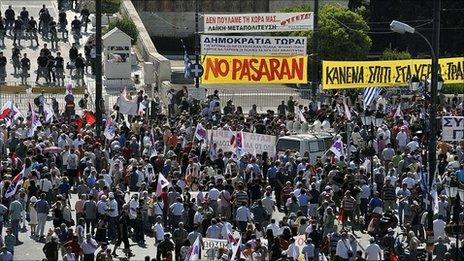Greece: It's nearly sorted (possibly)…
- Published
- comments

Here is my take from Exarchia in downtown Athens this morning, as I join what looks to be a huge demo of public sector workers across the city.
It is crunch time for the opponents of the austerity plan. It looks like it will go through parliament narrowly - possibly with the privatisation element ring-fenced into a separate law, so that the deputies do not vote directly on the privatisation of energy and water.
With remarkable aplomb, no fewer than 156 Greek MPs have registered to speak in the debate. So it will drag on for 48 hours.
Prime Minister George Papandreou's Pasok party's essential argument right now is this: the culpability and chaos at the heart of the eurozone have turned an agenda that should be about urgent, long-term structural reform into one of urgent insolvency.
Therefore they need to throw what has to be thrown at the solvency problem without forgetting the key is to remedy decades of post-war corruption, inefficiency and institutional weakness in Greece.
This was put to me eloquently by Elena Panaritis, one of the party's "nationally nominated" MPs (see her interview with me on Newsnight at 2230 on BBC Two tonight).
'Contemplating the abyss'
I put it to her that the party and the government is engaged in a kind of psychological transference - choosing to focus on the long-term structural issues because the short term solvency issue is so painful.
But the Greek political elite is demonstrating remarkable coolness under fire in this regard. Pasok is determined to govern alone and to get through this. It is not widely understood but the small business class, which is going to get hammered by tax rises, largely votes Pasok - so it is hard to see them coming out of the next election unscathed.
However, everyone here is now contemplating the abyss: it is becoming clearer to the proponents of default that it would mean, an instant "the ATM ate my card" situation for the whole population.
This, actually, is the strongest card Ms Panaritis and co can play with the Europeans: this is a crisis of the euro, not of Greece - a crisis of shoddy decision making, charisma-free leadership and general drift in Brussels, Frankfurt, Paris and Berlin.
So despite the formalities the subtext is becoming clear, I think.
The Greeks pass the austerity; they do some of it but not all of it. But by then the majority of the bad debt is on the books of the north European taxpayer - through the IMF, ECB and country governments.
Meanwhile, the 27% owned by banks is buried deep in a "Brady Bond" solution - for 30 years.
If your debt problems are solved on a scale of 30 years (private) to forever (the European states), then any problems in meeting the austerity timetable are not going to shake the earth. The Greek politicians and the Eurocrats will protest otherwise but I think this is the real situation that is emerging.
I will be tweeting from the demos.